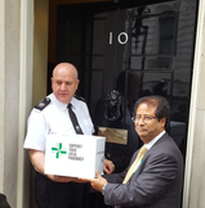
The NPA, together with PSNC and Pharmacy Voice have written a second letter to Prime Minister David Cameron, to accompany a delivery of another 200,000 signatures on the Support Your Local Pharmacy petition. The additional signatures brings the total calling on the government to change course on pharmacy policy to two million.
Read the full text of the letter can be seen below.
The NPA have said "The pharmacy campaign doesn't stop here - we are awaiting a further government announcement, and will continue to fight for pharmacies, and the patients we serve, whatever the outcome."
Dear Prime Minister,
Two million people ask you to reconsider plans that put local pharmacies at risk
Last month we delivered to you a petition containing nearly 1.8 million signatures. Since then 200,000 more patients and concerned citizens have registered their objections to Department of Health plans to cut local pharmacy services and here with we are sending a second consignment of petitions to Downing Street. This is the UK’s largest ever healthcare related petition.
Decisions taken in the next few weeks could have irreversible consequences for patients and communities up and down the country. The current circumstances within Government provide an opportunity to reconsider these proposals to ensure that your Ministers do not set in motion a chain of events leading to the closure of community pharmacies up and down the country.
We wish to remind you, on behalf of all the people who are supporting our campaign, that the regular supply of medicines from community pharmacies with advice when required, is the foundation for high quality, direct pharmaceutical care in communities across England. The DH proposals could see more patients obtaining their medicines without any face to face contact with a pharmacist. Greater use of technology for remote medicines supply might look like the key to efficiency, but direct support from pharmacists improves patients’ use of medicines, and ensures value from the £8bn annual NHS investment in those medicines in primary care.
Pharmacists, patient groups, local councils, several national newspapers and many others have expressed serious concerns and called for discussions on an alternative path to improved care and greater efficiency.
You would be doing a signal service to the nation to actively promote constructive engagement between government officials and community pharmacy representatives in the period to come. By working together, we can make the pharmacy sector and the health system overall more efficient, whilst ensuring that no patient loses the reassurance, care and support pharmacies provide.
We attach our earlier letter to you, for completeness.
Yours Sincerely,
Ian Strachan Sue Sharpe Rob Darracott
Chairman Chief Executive Chief Executive
National Pharmacy Association PSNC Pharmacy Voice
Two million people ask you to reconsider plans that put local pharmacies at risk
Last month we delivered to you a petition containing nearly 1.8 million signatures. Since then 200,000 more patients and concerned citizens have registered their objections to Department of Health plans to cut local pharmacy services and here with we are sending a second consignment of petitions to Downing Street. This is the UK’s largest ever healthcare related petition.
Decisions taken in the next few weeks could have irreversible consequences for patients and communities up and down the country. The current circumstances within Government provide an opportunity to reconsider these proposals to ensure that your Ministers do not set in motion a chain of events leading to the closure of community pharmacies up and down the country.
We wish to remind you, on behalf of all the people who are supporting our campaign, that the regular supply of medicines from community pharmacies with advice when required, is the foundation for high quality, direct pharmaceutical care in communities across England. The DH proposals could see more patients obtaining their medicines without any face to face contact with a pharmacist. Greater use of technology for remote medicines supply might look like the key to efficiency, but direct support from pharmacists improves patients’ use of medicines, and ensures value from the £8bn annual NHS investment in those medicines in primary care.
Pharmacists, patient groups, local councils, several national newspapers and many others have expressed serious concerns and called for discussions on an alternative path to improved care and greater efficiency.
You would be doing a signal service to the nation to actively promote constructive engagement between government officials and community pharmacy representatives in the period to come. By working together, we can make the pharmacy sector and the health system overall more efficient, whilst ensuring that no patient loses the reassurance, care and support pharmacies provide.
We attach our earlier letter to you, for completeness.
Yours Sincerely,
Ian Strachan Sue Sharpe Rob Darracott
Chairman Chief Executive Chief Executive
National Pharmacy Association PSNC Pharmacy Voice
 RSS Feed
RSS Feed